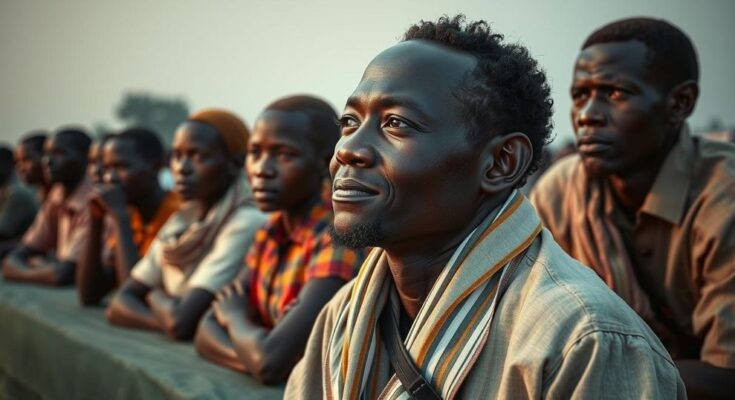The UN Commission on Human Rights in South Sudan released a video report highlighting ongoing violence and human rights violations in the country, driven by pervasive impunity. The report calls for comprehensive transitional justice, emphasizing the need for accountability and reform to cement a culture of peace and human rights. As the country marks the 11th anniversary of its civil war, the necessity for urgent actions to uphold justice is underscored.
On Sunday, the UN Commission on Human Rights in South Sudan released a significant 19-minute video report that highlights the ongoing severe human rights violations and violence plaguing the nation. Despite various peace initiatives since the civil conflict erupted in December 2013, widespread impunity has left many South Sudanese yearning for justice. Titled “The Unrelenting Cycle of Violence in South Sudan,” the video compiles firsthand accounts from victims, illustrating the profound anguish and societal fragmentation caused by this relentless cycle of violence.
The Commission’s report emphasizes the urgent necessity for effective transitional justice mechanisms, which encompass criminal accountability, truth-seeking, reparations, and profound institutional reform. These measures aim not only to break the cycle of violence but also to foster an environment where human rights are upheld and respected. The report articulates that establishing a comprehensive transitional justice framework signifies a transformative shift in societal values, aiming for a future where peace is secure and citizens can trust the state to protect their rights.
Commission Chair Yasmin Sooka expressed grave concerns over the escalating violence, pointing out that, “Pervasive impunity has emboldened individuals to commit horrific crimes as they have no fear of retribution.” Furthermore, she stated that the demand for justice among South Sudanese civilians is emphatically clear—they seek accountability for their suffering. The report underscores the failures of past peace agreements and stresses that, without immediate actions towards accountability, the cycle of violence is unlikely to cease.
Commissioner Barney Afako reiterated the critical need for prompt action, urging authorities to enact legislation for the Commission for Truth, Reconciliation and Healing. He urged engagement with the African Union to facilitate the establishment of a Hybrid Court, emphasizing that accountability is essential for peace and reconciliation to be realized in South Sudan.
The report asserts the infinite human cost of ongoing conflicts, stating, “For the victims and survivors, the lack of accountability remains one of the most significant barriers to peace.” The human toll, with hundreds of thousands dead and millions displaced, calls for addressing both governance and economic challenges to achieve sustainable peace.
As the anniversary of the conflict bears down, this video report starkly illustrates the heavy price of governmental failures to protect citizens and uphold their human rights. Moving forward, South Sudanese leaders must intensify their efforts towards holistic justice processes and eradicate the pervasive impunity that continues to devastate their nation.
The civil war in South Sudan, which began in mid-December 2013, has resulted in extensive human rights violations and widespread violence. Despite multiple peace agreements, including the 2015 Peace Agreement and the 2018 Revitalized Agreement, the country remains plagued by political violence and societal instability. Continuous impunity for perpetrators has perpetuated a cycle of conflict, leaving many South Sudanese citizens longing for justice and accountability. Transitional justice mechanisms are vital for addressing these issues and instilling hope for a peaceful future.
In conclusion, the UN Commission’s recent video report serves as a stark reminder of the persistent crises affecting South Sudan, driven primarily by impunity and a lack of accountability for human rights violations. The call for a genuine commitment to transitional justice and peace is imperative if South Sudan is to break free from its violent past and establish a governance structure that respects human rights and the rule of law.
Original Source: www.radiotamazuj.org




